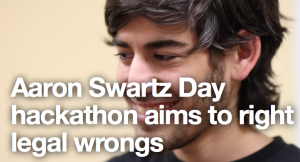 Celebrating Aaron Swartz at the Internet Archive hackathon
Celebrating Aaron Swartz at the Internet Archive hackathon
by Kate Conger for the Daily Dot.
From the article:
Prosecutors painted him as the bad kind of hacker—the Hollywood sort who breaks into computer networks with a flurry of keystrokes to steal top-secret information.
“It’s just nonsense. Of course Aaron was a hacker in the broad sense of the term, but in terms of the criminal term, he was no hacker and he didn’t do anything like that,” said Dan Purcell, a partner at the law firm of Keker & Van Nest LLP in San Francisco. Purcell would have represented Swartz had his case gone to trial. Instead, Swartz committed suicide in Jan. 2013, before the trial commenced.
“What Aaron did, whether you call it a prank or a consciousness-raising exercise, it was not a crime.”
This distinction is an important one for organizers of the memorial hackathon, like Lisa Rein, cofounder of Creative Commons, who selected “setting the record straight” as the theme for this year’s event. Like Purcell, she emphasized that Swartz’s actions were far from criminal.
But as much as Aaron Swartz Day is about dispersing misconceptions about what it means to be a hacker, it’s also about simply hacking.
